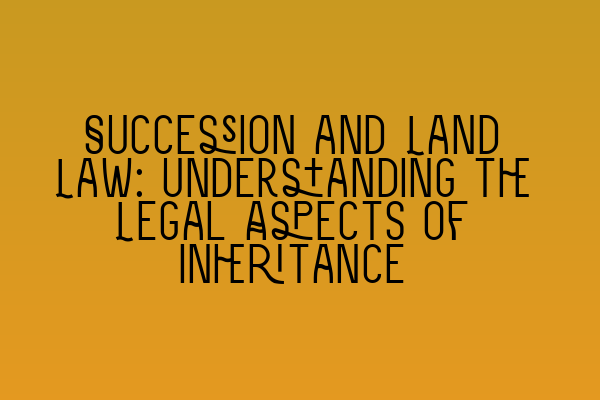Succession and Land Law: Understanding the Legal Aspects of Inheritance
Welcome to another informative blog post brought to you by SQE Property Law & Land Law. Today, we will dive deep into the intricacies of succession and land law, aiming to provide a comprehensive understanding of the legal aspects of inheritance. Whether you’re a solicitor, law student, or just someone interested in expanding their knowledge, this article is for you.
Before we begin, if you’re looking to test your knowledge on contract law, make sure to check out our related article on Interactive SQE Mock Tests for Contract Law: Test Your Knowledge. And for those interested in recent changes in contract law, Contract Law Reforms: An Analysis of Recent Changes is a must-read.
Now, let’s explore the world of succession and land law!
What Is Succession Law?
Succession law, also known as inheritance law, governs the transfer of property, assets, and rights from a deceased individual (the decedent) to their beneficiaries. In the context of land law, succession deals with the transfer of land and its associated rights, such as legal ownership and title.
Understanding Intestate Succession
Intestate succession refers to the legal process of distributing an individual’s property when they pass away without a valid will. In such cases, the law determines who the heirs of the estate will be and how their inheritance will be allocated.
It’s important to note that the rules of intestate succession can vary depending on the jurisdiction. For a comprehensive guide on this topic, refer to our detailed article on Parties in a Contract: Rights and Responsibilities.
Testamentary Succession and Wills
Unlike intestate succession, testamentary succession occurs when an individual creates a valid will to dictate how their property should be distributed after their death. The will outlines the wishes of the testator (the person creating the will) and provides instructions for the executor to carry out in accordance with their wishes.
To delve deeper into the importance of ethics in contract law, we recommend reading our comprehensive guide on The Importance of Ethics in Contract Law: A Comprehensive Guide.
Probate and the Role of Executors
Once a person passes away, their estate often goes through the process of probate. Probate involves the validation of the deceased person’s will, the identification and valuation of their assets, the settlement of any outstanding debts, and the distribution of the remaining assets to the beneficiaries.
The executor is the person appointed by the testator in their will to oversee the probate process. This role comes with significant responsibilities and duties, including gathering and valuing the assets, paying off debts, and distributing the estate as per the testator’s instructions.
Transferring Land through Inheritance
In the context of land law, the transfer of land through inheritance involves several legal elements. These include:
1. Legal Ownership: Legal ownership refers to the right to possess and enjoy the land. It grants the owner the ability to transfer or sell the land, as well as to use it for their own purposes.
2. Title: The title represents the legal evidence of ownership. It includes a detailed description of the land, any encumbrances or restrictions, and the name of the current owner.
To gain a deeper understanding of the various facets of land law, check out our article on Unveiling Duress and Undue Influence in Contracts.
3. Transferring Title: The transfer of title involves legal documents, such as deeds, that reflect the change in ownership from the deceased individual to the beneficiaries or heirs. It is important to ensure that the transfer is properly executed to avoid any legal complications in the future.
Conclusion
Succession and land law are complex areas of legal practice that require a deep understanding of the intricacies involved. By grasping the concepts of intestate and testamentary succession, probate, and the transfer of land, individuals can navigate the legal aspects of inheritance with confidence.
We hope you found this article enlightening and informative. If you have any more questions or would like to explore other aspects of property law, feel free to reach out to SQE Property Law & Land Law for expert advice and guidance.
Stay tuned for more insightful articles from SQE Property Law & Land Law, and make sure to visit our website for further resources and updates!
Related Articles:
Interactive SQE Mock Tests for Contract Law: Test Your Knowledge
Contract Law Reforms: An Analysis of Recent Changes
Parties in a Contract: Rights and Responsibilities
The Importance of Ethics in Contract Law: A Comprehensive Guide
Unveiling Duress and Undue Influence in Contracts
